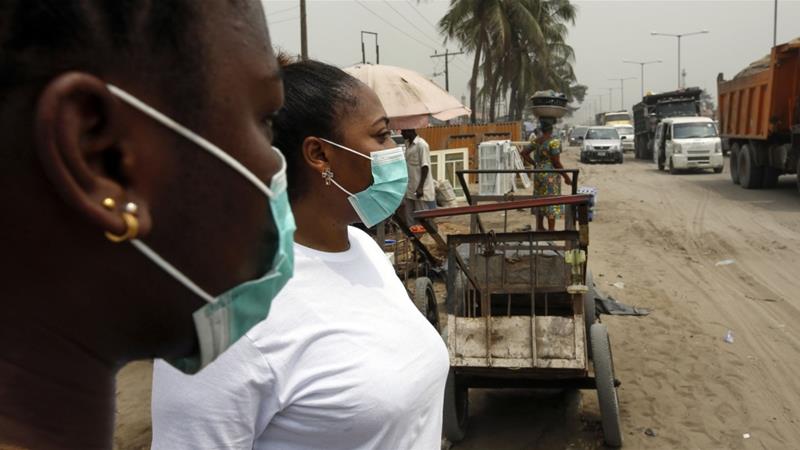Debunking Inibehe Effiong's jurisprudential incongruities on the Bello's conviction
BY RAYMOND NKANNEBE
I read the piece entitled, ‘Why the Conviction of Funke Akindele cannot stand in Law’ by barrister Inibehe Effiong ─ an impressionistic young lawyer of my generation whom many of us in the public space acknowledge as one of the promising rights activist of our generation. Not solely on account of his intellection, but in the sense of the energy he exerts and the industry he commits towards using the law as a tool of social engineering in Roscoe Pound’s thought. If I say I haven’t been impressed by this budding and restless legal mind, then I would be telling a lie.
In the said piece which takes from the recent conviction of a popular celebrity Funke Akindele and her husband, Abdul Rasheed Bello by a Magistrate Court in the Ogba magisterial district, for breach of the Regulations made by the Lagos State Government pursuant to the Public Health Law of Lagos State, 2015, Inibehe argued quite ingeniously that the entire conviction and sentence of the couple was ultra vires, null and void. And the title of his piece said it all.
My initial reaction to Inibehe’s opinion was to dismiss it as another opinion of a public spirited lawyer who wants to be heard. I also did not bother to engage him personally on social media where he has some considerable followership, as I imagined that would be another fruitless exercise.
Advertisement
I was however forced to embark on this rejoinder following calls from some persons who sought my opinion on the subject, particularly those of an old friend; a chemical engineer by profession whose message I woke up to, this morning on WhatsApp messenger. He had shared Inibehe’s opinion with me, and queried “this una law sef dey somehow biko. Which one is this again?”, and ended with a smiley that suggested frustration. I told him of my disavowal of Inibehe’s position on the subject, and assured him that I’d render a counter opinion. Hence this intervention.
Before we proceed, perhaps I should place it on record that I do not underestimate Inibehe’s undeniable understanding of the law. However, in the instant matter of the constitutionality, vel non of the conviction of the Bellos, I think activism might have gotten a better part of his understanding and espousal of the relevant laws.
THE ISSUES
Advertisement
A careful reading of the piece under reference would reveal that Inibehe’s grumble with the conviction and sentence of the Bellos, can be compartmentalised under four heads, namely (1) their purported conviction under a non-existing offence; (2) the lack of legislative competence of the Lagos State Government on the current pandemic in the state and across the federation; (3) the ultra vires powers of the executive Governor of Lagos state to issue regulations pursuant to the Public Health Law, 2015 and (4) the excessiveness of the punishment handed down by the Magistrate. It was on the basis of the foregoing that he took gratuitous umbrage against the decision of the Court.
I shall in this rejoinder, argue to the contrary that the Charge upon which the Bellos were arraigned, was competent, and their conviction and subsequent sentencing after pleading guilty, equally sound in law. I Shall do this under a distinct number of heads.
WERE THE DEFENDANTS CHARGED FOR AN OFFENCE UNKNOWN TO LAW?
Inibehe argued that sections 8(1)(a)&(b) and (17)(1)(I) of the Lagos State Infections Disease (Emergency Provision) Regulation,2020 was not an offence known to law. And the ostensible reason for this assertion is that being a subsidiary legalisation, it cannot be the basis of criminal liability. It was further contented that to the extent that the directives prohibiting a gathering of more than 20 persons by the Lagos state governor was not codified in the Public Health Law, Vol. 9, Ch. 16 of 2015, or in the 2020 Regulations, same cannot eventuate criminal liability.
Advertisement
Let’s hear from him. “…Let me reiterate that the Governor’s social distancing directive that restrict gathering in Lagos State which the defendants purportedly contravened is not an Act of the National Assembly, or a Law of the Lagos State House of Assembly, neither is it a subsidiary legislation or an instrument under the provisions of the law.
Therefore, by the authority of Section 36 (12) of the Constitution, and the Supreme Court decision in Aoko V. Fagbemi & Ors. (1961) 1 All NLR 400, the conviction of Funke Akindele and her husband is unconstitutional.
As I contended earlier, there is no provision in the Public Health Law of Lagos State or the Infectious Disease Regulations that makes a gathering of more than twenty persons or any gathering for that matter a criminal offence.”
A veritable way to commence the disentangling of Inibehe’s moonshine postulations is to reproduce the provisions of the Charge which narrates the offence the defendants were charged with, as well as the punishment. It reads,
Advertisement
“That you (1) FUNKE AKINDELE (2) ABDUL RASHEED BELLO on the 4th day of April, 2020 at 9 Gbadamosi Close off Amen Estate, Ibeju Lekki in the Lagos Magisterial District gathered at the aforementioned address with over twenty persons contrary to the social distancing directives of Mr. Governor of Lagos State made pursuant to Regulation 8(1)(a) &(b) and 17(1)(i) of the Lagos State Infectious Disease (Emergency Prevention) Regulations 2020 and thereby committed an offence punishable under section 58 Public Health Law Cap. 16, Vol. 9 Laws of Lagos State, 2015.”
From the reproduced charge sheet, the following can be deduced:
Advertisement
(1) There was a directive issued by the Lagos State Government prohibiting gathering of more than 20 persons;
(2) The directives were issued or made pursuant to the 2020 Infectious Diseases Regulations
Advertisement
(3) The Regulations were issued pursuant to the powers enabling the Governor in that behalf by the Public Health Law, 2015.
From the above factual cum legal deductions, it is wrong to suggest that the offence of ‘Social Distancing’ was a mere directive of the Lagos state Governor without the backing of a substantive law as played out in the Court of Appeal decision in Faith Okafor v Lagos State Government (2017) 4 NWLR (Pt.1556) 404 CA heavily relied upon by Mr. Effiong.
Advertisement
The 2020 Regulation for the avoidance of doubt were issued in exercise of the plenitude of powers conferred on the Lagos State Governor vide the Public Health Law Cap Ch. 16 Vol. 9 Laws of Lagos State 2015 and section 8 of the Quarantine Act, Cap Q2 Laws of the Federation of Nigeria (2004) and all other laws enabling the Governor in that regard subject however to the relevant provisions of the 1999 Constitution. The contention therefore that the directives proscribing gathering of more than 20 persons by the Lagos State Governor is without a statutory root is therefore misleading.
Whereas President Muhammadu Buhari dithered in issuing Federal Regulations pursuant to section 4 of the Quarantine Act, it is worth noting that the Lagos State Government exercised its powers under section 8 of the Act to issue Regulations to contain the spread of the pandemic as early as 27th March, 2020 before the president followed suit on the 30th of March 2020. Now, the effect of the Federal Regulations even though later in time, is that it modified or in the often spoken language, rendered the Lagos Regulations in abeyance subject however to the extent of what is duplicated in the local regulation or the areas of inconsistency between them. I shall come back to this later. But in the meantime, I submit that in so far as the Lagos Regulations were issued in furtherance of these statutory enactments, it follows by legal consequence that the directives of the state governor issued on the 20th of March 2020 on social distancing and ratified by the Regulations, took on the stature of legislation capable of criminal liability vide section 58 of the Public Health Law.
Thus it is wrong and misleading to contend, as did Inibehe, that the defendants were charged for “contravening a directive of the Governor which is outside the regulations itself”. This is because, even if repetitively, the directives having been made by the Governor in pursuance of the 2020 Regulations, which I have just shown take their life from the Public Health Law of Lagos State, assumes the nature of a substantive law the breach of which is punishable at law. This position is supported by the trite principle of law that a subsidiary legislation has the same force and effect as the principal or enabling statute unless it is proved that the Regulations was not validly made. This was the position of the intermediate appellate Court in Trade Bank Plc v. L.L.G.C (2003) 3 NWLR (Pt. 806) 11 @ 27.
It has not been shown that the 2020 Regulations were not validly made, nor did they in any way erode the powers constituted in the substantive law, namely, the Public Health Act. Consequently, the directives of the Lagos State Governor made on the 20th of March proscribing the gathering of more than 20 persons having been issued in furtherance of the 2020 Regulations which in itself derives livelihood from the Public Health Law, tantamount to sufficient codification of the offence for which the defendants were charged with. Section 36(12) of the Constitution heavily relied upon by Inibehe was therefore inapposite in the circumstances.
Another collateral issue is the submission that “there is no provision in the Public Health Law of Lagos State or the Infectious Disease Regulations that makes a gathering of more than 20 persons or any gathering for that matter criminal offence”. This too, is with respect erroneous and apparently stems from a harebrained and disjointed construction of the associated laws.
Now, section 8(1)(a) of the Regulations made pursuant to the Public Health Law provides:
“The Governor may restrict or prohibit the gathering of persons in the Local Area, such as conferences, meetings, festivals, private events, religious services, public visits, and such other events, save where the written approval of the Governor is obtained for such gathering”.
Extrapolatively, it is my submission therefore that the above provisions were fully given life by the directives of the Governor of Lagos State on the 20th of March, 2020 prohibiting the gathering of more than 20 persons and which was ratified by the Regulations issued some seven (7) days later on the 27th of March. Paragraph 1(2) of the Regulations provides instructively:
“All acts done prior to the commencement of these Regulations to curtail the spread of the Coronavirus Disease 2019 (COVID 19) are hereby ratified”.
Now, according to the Black’s Law Dictionary, 9th Edn. By Bryan A. Garner @ page 1452, ratification, is the “confirmation and acceptance of a previous act thereby making the act valid from the moment it was done”.
My learned friend argues that section 8(1)(a) of the Regulation is not enough codification against public gathering and further submits that the “Regulation should have expressly and specifically prescribed that gathering is restricted and prohibited in Lagos before it can be relied upon to convict a violator”. Nothing can be further from the truth with respect. The Regulations having given the Governor the power to make a restrictive order, and the latter having exercised same, the breach of the said regulations on gathering amounts to an offence in so far as the Regulations in furtherance of which the exercise of the power was done, was made in line with the Public Health Law, 2015, in itself a substantive law.
It is imperative to note that section 17 of the Regulations provide expressly that persons who breach any of the provisions would be liable for prosecution. Now section 58 of the Public Health Law, brings all the pieces together. It reads:
“For any contravention of the provisions of this Law or any Regulation made under this Law for which no other penalty is provided….”
I submit that by parity of reasoning, the breach of the social distancing directives of the Lagos State Governor made under the 2020 Regulations which were issued in pursuance of the Public Health Law, graduates to the breach of a substantive law via Trade Bank v L.L.G.C (supra). It is therefore wrong and disingenuous to suggest otherwise. Undoubtedly, Inibehe commits the fallacy of centrifugal construction of associated provisions of the law. A harmonious construction of the provisions of sections 8(1)(i); 17(1) of the Regulation and 58 of the Public Health Law per Ojokolobo v Alamu (1987) JELR 53658 (SC) and associated cases, would have yielded the positive impression that the offence for which the defendants were charged were not only known, but also codified by inference in a substantive law, namely the Public Health Law of Lagos State.
PURPORTED INTERPLAY OF THE DOCTRINE OF COVERING THE FIELD VIS A VIS ISSUANCE OF REGULATIONS UNDER THE QUARANTINE ACT
I submit that the contention that the Federal Government through President Muhammadu Buhari having issued the Regulations in furtherance of the Quarantine Act automatically nullifies and/or keeps in abeyance the Regulations issued by the Lagos State Governor under section 8 of the same Quarantine Act on the one hand, and the Public Health Law of Lagos State, 2015, is also wrong.
Admittedly President Muhammadu Buhari having issued the Regulations pursuant to the Quarantine Act (being a matter in the Exclusive Legislative List), should ordinarily operate to keep in abeyance any further Regulations made by a State Governor in line with section 8 of the Quarantine Act as per A.G. Ogun State v. A.G. Fed (1982) 1-2 SC. 13 @ 121-122. However I hasten to add that the doctrine of Covering the Field being a principle committed to a fulsome actualization of a federalist constitution, does not operate in an all but nothing dimension as Inibehe appeared to elevate it. I will explain.
A federal legislation can only suspend the operability of a state legislation or Regulation where the provisions are inconsistent such that the one (usually the state legislation), would affect and/or impede the attainment of the objective(s) of the other. Where this is not the case, the doctrine would not have a domino effect of rendering the state law in abeyance. This usually rears its head in beneficial statutes often relevant at a time of emergency such as now.
As one author rightly put it, laws that are beneficial in character fall into a different category in the consideration of the doctrine of covering the field. The statutes that are relevant here are those that create duties in emergency or rescue situations. Thus, where the provisions of a federal statute and a state statute both create beneficial duties for the public on the same concurrent subject, they are supplementary to each other. An inconsistency or an intention to cover the field completely by the federal legislation cannot be presumed against the state law. What happens in such situations is to see what action has been taken under the federal law. Where action has been taken under the federal law (ie, the federal law is executed) the state law becomes powerless in the event of inconsistency between them. The case of State of Victoria v The Commonwealth (1937) 58 CLR 618. Is apposite on this point.
Further, by the principle of ‘Partial Coverage’, where the terms of a federal law is shown to have gone only part of the way to cover a concurrent subject-matter, a state legislation can validly deal with the areas of the subject-matter left untouched by the federal legislation – Forsyth v Commissioner of Stamp Duties [1966] HCA 5. The same principle applies to a situation where the effect of a federal law is to enhance a federal purpose only on a concurrent subject. In that case a state can also make its own legislation to enhance it’s own purposes – Swift Australian Co (Pty) Ltd v Boyd Parkinson [1962] HCA 41. In another form, the coverage may be described as ‘territorial’. The federal law limits its application to the federal level, leaving the states free to exercise their legislative powers on the same subject on the Concurrent List – Adetona v Attorney-General, Ogun State [1984] 5 NCLR 299, 308-309. And at times both the federal and state laws are taken as a ‘combined’ legislation. Where both federal and state legislations are by the terms of the federal law permitted to alternatively deal with a situation, the federal law has only partial coverage – Aberdare Collieries Proprietary Ltd v The Commonwealth [1952] HCA.
Now, the point is: a calm consideration of the Quarantine Act would reveal that it gives both the Federal and State Governments the powers to issue Regulations. However, the exercise of those powers by the President may overtake the exercise of same by the State Government. See sections 4 & 8 of the Quarantine Act. But that is not all. On the basis of the principle of partial coverage, I submit that the Regulations issued by the Lagos State Government particularly the provisions enabling the state Governor to issue directives prohibiting gathering, having not been contained in the Regulations issued by President Muhammadu Buhari on the 30th of March 2020, there was therefore no ‘field’ covered by the Federal Regulation to prevent the Lagos State Government to further make Regulations for an efficient management of the situation within its territory. This is the philosophy behind the principle of partial coverage particularly in Beneficial Statutes as enunciated by our apex Court and other decisions of ‘High Courts’ in the commonwealth as referenced above.
Assuming I am wrong on the limits of the applicability of the doctrine, I hasten to submit that the Lagos State Governor, having also issued the 2020 Regulations in furtherance of the Public Health Law of Lagos State, there was ab initio no basis for invoking the doctrine of Covering the Field, as the doctrine can only be invoked in the deconstruction of subject matters contained in the concurrent legislative list of which ‘health’ is not one.
To be sure, Nigeria has a three-tier federal structure consisting of the federal, state, and local governments. Each level of government has constitutionally guaranteed autonomy in the area in which it operates. Local government is a guaranteed third-tier of government, even though the 1999 Constitution, Section 7(1) provides that state governments shall “ensure their existence under a law which provides for the establishment, structure, composition, finance and functions of such councils.”
The legislative lists in the Constitution provide for the distribution of powers. The exclusive legislative list is assigned to the federal government; the concurrent legislative list is assigned to both federal and state governments and defines areas in which both can legislate; and the residual legislative list is assigned to the states. The exclusive legislative list has sixty-eight items, while the concurrent legislative list has fifteen.
The exclusive legislative list as contained in the 1st Schedule to the 1999 Constitition (as amended) includes: accounts of the government of the federation; arms, ammunition, and explosives; aviation (including airports); awards of honours and decoration; bankruptcy and insolvency; banks, banking, bills of exchange, and promissory notes; borrowing monies inside and outside Nigeria for the purposes of the federation or any state; census; citizenship, naturalization, and aliens; commercial and industrial monopolies; construction and maintenance of federal trunk roads; control of capital issues; copyrights; creation of states; currency, coinage, and legal tender, to name a few.
The concurrent legislative list as adumbrated in the Second Schedule include: allocation of revenue; antiquities and monuments; archives; collection of taxes; electoral law; electric power; exhibition of cinematography films; industrial, commercial, or agricultural development; scientific and technological research; statistics; trigonometrical, cadastral, and topographical surveys; universities; technological and postprimary education.
However, unlike the 1995 Draft Constitution, which specified a state legislative list, the 1999 Constitution has no such list. However, all matters not identified in the exclusive and concurrent lists, come under the jurisdiction of the states. These residual powers are in fact extensive. They include, among others, health services, rural development, and social welfare.
Thus, health not being in the exclusive nor concurrent legislative lists, the invocation of the doctrine of covering the field, is in my humble opinion, non sequitur. I note that there are some persons who hold the view however that health is an item in the concurrent legislative list. But that would be a subject of discourse for another day. Sufficient for our purposes is to submit that the Regulations issued by the Lagos State Governor are in order, particularly those under which the defendants were charged and convicted, in so far as they do not overreach the Regulations issued by President Muhammadu Buhari. The law is settled beyond per adventure that the express mention of a thing, is the exclusion of all things not stated. A fine Latinism encapsulates it: expressio unis et exclusio alteirus. The point I’m trying to make even at the risk of prolixity, is that the Regulations issued by President Muhammadu Buhari, having not expressly proscribed the gathering of more than 20 persons, the Lagos State Government was on a strong footing to cover that gap in its own Regulations issued pursuant to section 8 of the Quarantine Act, and section 43 of the Public Health Law of Lagos state. Consequently the argument tending to covering the field doctrine, is at best a resort to arid legalism.
ON THE PURPORTED LACK OF VIRES IN THE GOVERNOR TO ISSUE REGULATIONS UNER THE PUBLIC HEALTH LAW
This is another issue which I don’t suppose my learned friend was intentional about. He argues that under the Public Health Law, only the Commissioner of Health can issue a Regulation, and not the Governor. A position which he says raises serious questions of the validity of the Regulations.
Admittedly, the relevant sections of the Public Health Law speaks of “The Commissioner“, yet it is a basic Constitutional principle that executive powers of the state are exercised through ministers and Commissioners. Section 193(1) of the Constitution dealing with exercise of executive powers provide:
“The Governor of a state may, in his discretion, assign to the Deputy Governor or any Commissioner of the Government was of the State responsibility for any business of the Government of that state, including the administration of any depart of Government“.
It follows therefore that ministers and Commissioners are merely ‘hands’ of the President and Governors respectively such that they they cannot be estopped from exercising the powers statutorily invested in them by the Constitition in so far as the exercise of the power is done in good faith and altruistically for the greatest good of the greatest number, as in the case afoot.
Taking the point further, it is hornbook that the donation of a power, does not estopp the donor of the power from exercising the powers earlier donated. This principle was clearly enunciated by the apex Court in Ude v Nwara (1993) 2 NWLR (Pt. 278) 647.
Consequently, the decision of the Lagos State Governor to issue the said Regulations is not ultra vires his powers being part of the executive powers constitutionally warehoused in his office as the Executive Governor of the state.
If anything, it is an administrative faux pas, that does not rub off on the validity of the Regulations issued as suggested. The kerfuffle over this is with respect a needless storm in a tea cup.
ALLEGED PUNISHMENT BEING IN EXCESS OF THE LAW
Finally, it was also contended with some seriousness that the punishment handed down by the Magistrate exceeded the punishment stipulated by law.
Now, the law is entrenched that the punishment a Court can impose for an offence after conviction cannot exceed those stated in the law. While it may be less where the punishment is not mandatory, it cannot be more than what is stated in the legislation. Section 29(2) of the Lagos State Magistrate Court Law, 2009 puts it succinctly:
“A Magistrate shall have jurisdiction for the summary trial of offences and on the conviction of any person accused of any such offence, may, subject to the other provisions of this law, impose the punishment provided by law for that offence“.
Now the punishment section of the Public Health Law, 2015 is as contained in section 58 of the Law. It reads:
“For any contravention of the provisions of this Law or any Regulation made under this Law for which no other penalty is provided, the offender commits an offence and is liable on conviction to a fine of One Hundred Thousand Naira (N100,000.00) or to any non-custodial sentence and if a corporate body, to a fine of Five Hundred Thousand Naira (N500,000.00).”
Following their conviction, as rightly stated by Inibehe, the trial Magistrate sentenced Funke Akindele and her husband to 14 days community service each, to start from 9.00am to 12 noon each day during which they are to sensitize the public on the COVID-19 pandemic in ten major areas of the state. They are also to pay a fine of N100, 000 each after which they would observe the period for isolation.
It was argued that the use of the disjunctive particle “or” in the punishment section of the law was to be applied disjunctively such that the defendants could only be liable to punishment either in Fine, or the non-custodial sentence as enumerated in the form of community service, and not both.
I differ with respect. As a general rule, the use of “or” in a statute is disjunctive vide section 18(3) of the Interpretation Act Cap 192, LFN 1990 which states that the use of the word “or” and the word “other”, shall in any enactment, be construed disjunctively and not implying any similarity”. See Kabirikim v. Emefor & Ors (2009) LPELR- 902 (SC).
However there are circumstances where the use of the particle “or”, can be construed conjunctively in a statute. These are in cases where the ultimate objective of the enactment of the statute would be best achieved by a conjunctive interpretation as in this case.
The modern principle of statutory interpretation represents a significant shift away from the “plain meaning” rule. Under the modern approach, Courts look at the words of a statute in their context, considering such external factors as legislative intent, textual meaning, and legal norms, when interpreting a statutory provision.
As recognized in Elmer Dreidger, Construction of Statutes, 2nd ed. (Toronto: Butterworths, 1983) and in the Supreme Court of Canada’s leading decision in Rizzo Shoes Ltd. (Re), [1988] 1 S.C.R. 27. Courts are more inclined to adopt what is now known as the “modern principle of statutory interpretation to wit: the words of an Act are to be read in their entire context and in their grammatical and ordinary sense harmoniously with the scheme of the Act, the object of the Act, and the intention of Parliament.
Driving the point home, it is indubitably clear that the main purpose of the Public Health Law and the Regulations issued pursuant to the law is to check against behaviour that risk spreading the Covid-19 virus. Thus, the best way that ultimate objective could be achieved is to get violators to preach the gospel of the Regulations and not mere payment of fines, as the law is not revenue driven.
I imagine that it was in this jurisprudential frame of mind that the Learned Magistrate laid a conjunctive construction to the word “or” while imposing the punishment to the Bellos. This is the prevailing jurisprudence in the interpretation of statutes in so far as it enables the realisation of the ultimate goal of legislation. It is therefore wrong with respect to Inibehe Effiong to suggest that the Learned Magistrate was in error on this score.
CONCLUSION:
The fundamentum of a trial is not so much in the reason for the decision as in the “rightness of the decision”. Thus it is axiomatic in appellate practice that the appellate courts are more interested in the rightness of a decision, than in the route embarked upon to arrive at same.
The point is, on its dry bones, the decision of the Magistrate Court was right irrespective of the clumsy drafting that was brought into the Charge Sheet upon which the Bellos were convicted. While I understand the jusrisdictional implications of a trial, I do not see any jurisdictional gaffes as alleged by Inibehe such that has the vistas of rendering the whole trial a nullity. I have tried as far as practicable to show this in this thankless effort which I hope is able to expand the frontiers of the conversation, howbeit academic.
All said and done, the Bellos are entitled ex debito justitiae to challenge the decision on appeal to further test some of the legal challenge that have been visited on the decision of the Magistrate. That said, I take the considered view that the opinion of Inibehe Effiong on the subject may be too sweeping, and I’ll advise that Nigerians, should treat most of the submissions with caution as it does not represent the extant position of the law on nearly all the points raised, even as I acknowledge his rights as a professional to volunteer his opinion on such a Constitutional debate of jurisprudential import.
Raymond Nkannebe, a Lagos based legal practitioner is of Synergy Attornies. He tweets @RayNkah
Views expressed by contributors are strictly personal and not of TheCable.






